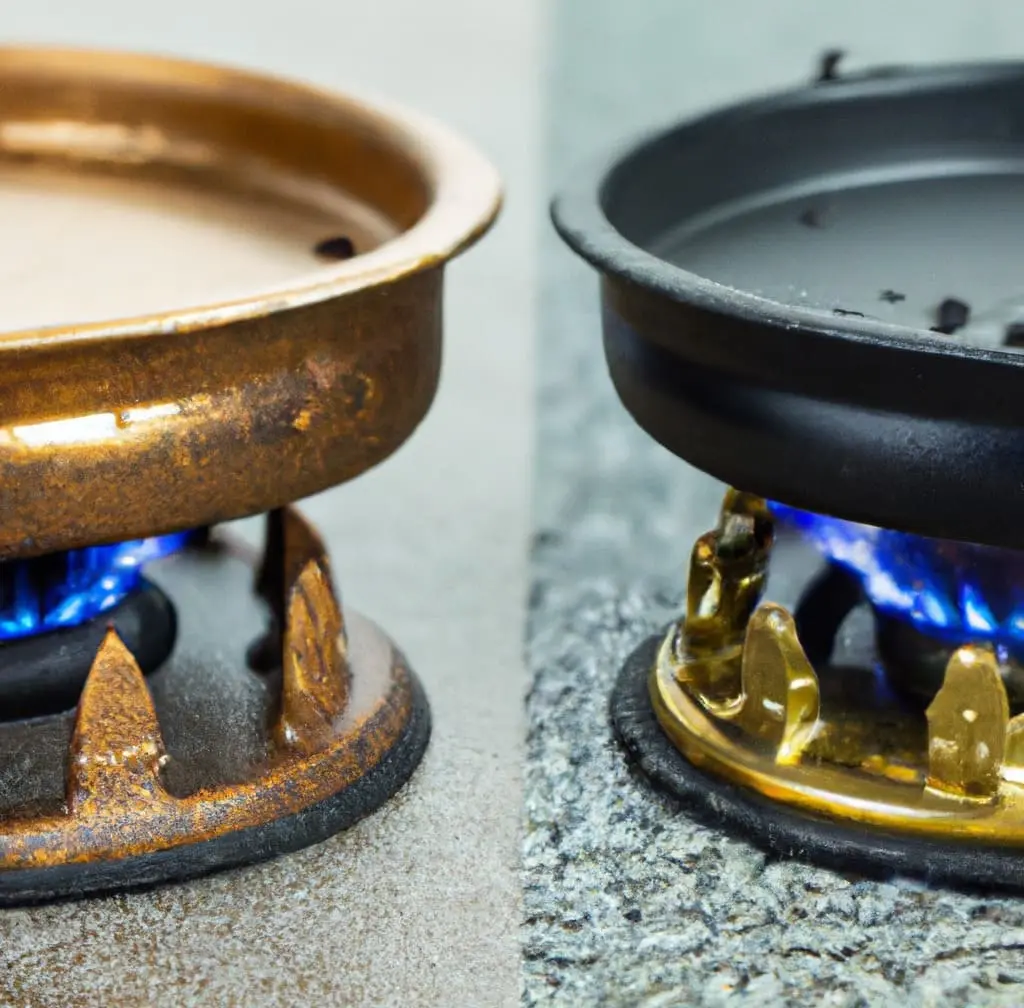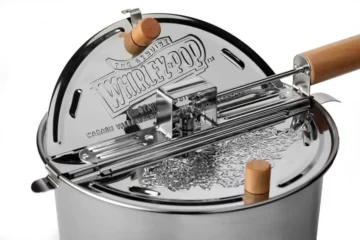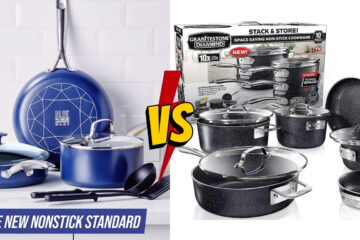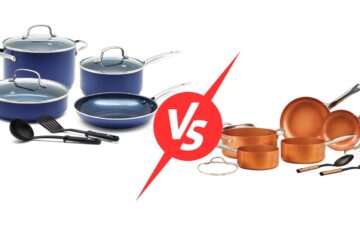Cooking on a gas stove is a staple in many households. The debate between brass burners and cast iron burners has been ongoing for quite some time. Both types of burners have unique advantages and disadvantages, making it difficult to decide which is better for your cooking needs. Brass burners are known for their fast and even heating. In contrast, cast iron burners are praised for their durability and ability to hold heat.
Today in this article, we will explore the key differences between brass burners vs cast iron burners and weigh their pros and cons to help you make an informed decision. We will delve into heat distribution, maintenance, cost, and other essential factors to consider when choosing the ideal burner for your gas stove. So, whether you’re a professional chef or a home cook, keep reading to discover which type of burner best fits your cooking style and needs.
Brass Burners
Brass burners typically refer to the burners on a gas stove or cooktop made from brass. Brass is a popular material for burners because it is a good conductor of heat and is durable.
Brass burners are often found on high-end gas stoves and cooktops because they can distribute heat evenly across the burner’s surface, resulting in more consistent cooking results. Additionally, brass burners are often designed with a larger surface area than other types of burners, allowing larger pots and pans to be used without crowding the surface.
Advantages of brass burners
There are several advantages of brass burners over other types of burners, including:
- Better heat distribution: Brass is an excellent conductor of heat, which means that brass burners can distribute heat more evenly than other burners. This can result in more consistent cooking results and fewer hot spots.
- Durability: These burners are durable and can withstand heavy use and high heat. They are less likely to warp or corrode over time, which means they can last longer than other burners.
- Larger surface area: Brass burners are often designed with a larger surface area than other types of burners, allowing larger pots and pans to be used without crowding the surface. This can be especially useful for cooking large meals or for use in commercial kitchens.
- Aesthetics: They have a classic and elegant look that can add a touch of sophistication to any kitchen. They can also be easier to clean and maintain than other types of burners.
Disadvantages of brass burners
While there are several advantages of brass burners, there are also a few potential disadvantages to consider:
- Cost: Brass burners are often found on high-end gas stoves and cooktops, making them more expensive than other burners. This can be a disadvantage for those who are on a tight budget.
- Maintenance: While brass burners are generally durable, they require maintenance to keep them in good condition. They can be more challenging to clean than other types of burners and may require regular polishing to keep them looking their best.
- Staining: Over time, brass burners can develop stains or discoloration from exposure to high heat or certain foods. This can be difficult to remove and require unique cleaning products or techniques.
- Corrosion: While brass is generally durable, it can be susceptible to corrosion over time. This can be a particular concern in areas with high humidity or exposure to salt water.
Examples of popular brass burner models
There are several popular brass burner models on the market, including:
- Wolf SRT366 – This 36-inch gas cooktop features six brass burners, including a 20,000 BTU power burner for high-heat cooking.
- Thermador SGSX365TS – For quicThis gas cooktop features five brass burners with 22,000 BTUs.
- Viking for quick and efficient cooking VGRT536 – This 36-inch gas range features four brass burners and a VariSimmer setting for precise temperature control.
- Bosch NGM8657UC – With five brass burners, including a 16,000 BTU power burner, this 36-inch gas cooktop provides fast and efficient cooking.
- GE Cafe CGU366SEHSS – This 36-inch gas cooktop features six brass burners, including a 20,000 BTU tri-ring burner for versatile cooking options.
Cast Iron Burners
Cast iron burners are heating elements commonly used in gas stoves, grills, and other cooking appliances. They are made of cast iron, a durable and heat-resistant material that can withstand high temperatures.
Cast iron burners are typically designed with small holes or slots that allow gas to flow through and ignite when exposed to a spark or flame. The heat from the burning gas then radiates out from the burner, heating the cooking surface above.
Advantages of cast iron burners
Cast iron burners offer several advantages over other types of burners, including:
- Durability: Cast iron is a highly durable material that can withstand high temperatures and is resistant to cracking or breaking, making it a good choice for burners that will see frequent use.
- Even heating: These burners distribute heat evenly across the cooking surface, which can help to prevent hot spots and ensure that food cooks evenly.
- Retains heat: Cast iron has a high heat retention capacity, which means it can hold heat for a long time. This makes it ideal for searing meats or other foods that require a high temperature for an extended period.
- Versatility: Cast iron burners can be used on various cooking appliances, including gas stoves, grills, and outdoor cookers.
- Cost-effective: They are generally less expensive than other burners, making them an affordable option for those on a budget.
- Easy to clean: Cast iron burners are relatively easy to clean and maintain, which can help to extend their lifespan.
Disadvantages of cast iron burners
While cast iron burners have many advantages, there are also some disadvantages to consider:
- Weight: Cast iron burners are heavy, making them difficult to move or replace. They may also put additional strain on the appliance they are installed in.
- Slow heating: Cast iron burners can take longer to heat up than other burners, which can be an issue if you need to cook something quickly.
- Uneven heating: While cast iron burners are known for distributing heat evenly, they can sometimes develop hot spots over time if they need to be correctly maintained or used frequently.
- Fragility: While cast iron is durable, it can also be fragile. Dropping or banging a cast iron burner can cause it to crack or break, rendering it unusable.
- Not suitable for all cookware: Cast iron burners may only be suitable for some types of cookware, as they can scratch or damage non-stick coatings or glass cooktops.
Examples of popular cast iron burner models
- Weber 7508 Stainless-Steel Burner Tube Set: For WebeThisthree stainless steel burners are designed to fit. Each b for Weber Genesis Silver B and C gas grill burner is made of durable cast iron and has a tapered shape to distribute heat evenly.
- Char-Broil Universal Fit Cast Iron Burner: This is a uni-universal replacement burner for most gas grills. It is made of heavy-duty cast iron and features multiple venturi tubes for even heating.
- Camp Chef Professional 14″ x 32″ Fry Griddle: Outdoor cooking is made possible with this cast iron griddle. For easy cleaning, it features two burners and a grease management system.
- Whirlpool WCG97US0HS 30″ Gas Cooktop: This gas cooktop features four sealed burners, including two 15,000 BTU power burners and two 5,000 BTU simmer burners. The burners are made of durable cast iron and electronic feature ignition.
- Frigidaire FFGC3026SS 30″ Gas Cooktop: This gas cooktop features four sealed burners, including a 17,000 BTU power burner and a 5,000 BTU simmer burner. The cast iron burners feature a matte black finish for a sleek look.
Brass Burners Vs Cast Iron Burners
When choosing a stove or cooktop, one of the most important decisions is whether to go with brass burners or cast iron burners. Both materials have advantages and disadvantages; understanding these differences can help you make an informed decision.
1. Material Properties:
The first difference between brass and cast iron burners is the material properties. Brass is a metal alloy made of copper and zinc, while cast iron is made of iron, carbon, and silicon. Brass is softer than cast iron, making it easier to machine and shape. Cast iron, on the other hand, is more complex and more durable.
2. Heat Conductivity:
Brass has a higher thermal conductivity than cast iron, meaning it can transfer heat more efficiently. This makes brass burners more responsive and faster to heat up than cast iron burners. However, cast iron retains heat better, which can be beneficial when cooking dishes requiring longer or lower heat.
3. Durability:
Cast iron burners are known for their durability and resistance to damage, such as cracking or chipping. Brass burners, while still durable, are more susceptible to damage, such as scratches or dents. This can be a consideration if you need more clarity on your cookware or plan to use it frequently.
4. Corrosion Resistance:
Brass is highly corrosion-resistant, making it ideal for moist or humid environments. Cast iron, on the other hand, is more susceptible to rusting if correctly seasoned and maintained. However, many cast iron burners are coated with enamel or other protective coatings to prevent rusting.
5. Maintenance:
Cast iron burners require more maintenance than brass burners. Cast iron must be seasoned before use and requires regular cleaning and maintenance to prevent rusting or corrosion. Brass is easy to clean and maintain and does not require seasoning.
6. Cost:
The cost of brass burners is typically higher than cast iron burners due to the higher cost of the raw materials and the other manufacturing processes involved in shaping and machining the brass.
- Gaggenau Vs Miele: Which Is The Better Appliance Brand?
- Alcohol Stove Vs Canister Stove (Who Wins The Cooking Game)
Where To Buy Replacement Stove Burners?
You can buy replacement stove burners from a variety of places. Here are a few options:
Manufacturer’s website
If you know the brand and model of your stove, check the manufacturer’s website to see if they sell replacement burners.
Online retailers
Online retailers like Amazon, eBay, Walmart, and Home Depot sell replacement stove burners. You can browse their websites and search for the specific type of burner you need.
Local appliance stores
Check with local appliance stores to see if they sell replacement stove burners. They may carry parts for specific brands and models.
Hardware stores
Some hardware stores carry replacement stove burners. Check with your local store to see if they have them in stock.
Specialty appliance parts stores
There are also specialty stores that sell appliance parts. Check if one is in your area or search online for one that sells stove burners.
Are Brass Burners Better?
Brass burners can be better in terms of durability, heat distribution, and corrosion resistance than other materials used for burners. However, the specific benefits depend on the application and the quality of the brass used.
Is Brass Burner Good For Gas Stoves?
For several reasons, brass burners are generally considered suitable for gas stoves. Firstly, brass is an excellent conductor of heat, meaning it heats up quickly and distributes heat evenly across the surface of the burner. This can help to cook food more evenly and prevent hot spots that can burn or undercook certain parts of the food.
In addition, brass burners are also highly durable and resistant to corrosion, which can help extend your gas stove’s lifespan. They also tend to be more efficient at converting gas into heat, which can help to save on fuel costs over time.
Bottom Line
So what’s the overall verdict? Both brass and cast iron burners have their unique strengths and weaknesses when it comes to cooking. Brass burners offer more precise temperature control and are less likely to corrode. In contrast, cast iron burners are more durable and can withstand higher heat.
Choosing between the two will ultimately depend on your cooking needs and preferences. Whether you opt for brass or cast iron burners, maintain them properly to ensure optimal performance and longevity. By considering the pros and cons of each type of burner, you can make an informed decision and enjoy delicious meals for years to come.




